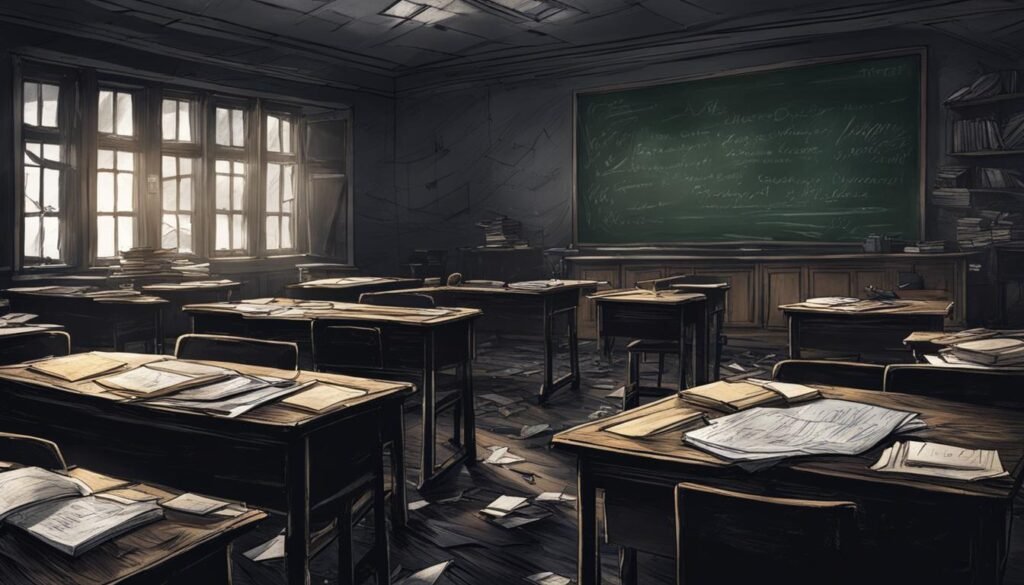Are you tired of dealing with difficult college professors? In the Philippines, students often face the daunting task of navigating through challenging professors who are referred to as “Terror Profs.” These professors may exhibit characteristics such as a short temper, assigning time-consuming requirements, and giving difficult exams. However, there are strategies that you can employ to succeed in dealing with them.
Working hard is one of the key success strategies when handling difficult college professors. Dedicate yourself to studying diligently and completing assignments on time. This will not only help you understand the subject matter better but also show your professor your commitment and dedication.
Arriving early to class is another effective strategy. Punctuality not only demonstrates respect for your professor but also allows you to have a few moments to interact with them before the class begins. This can help in building a positive rapport and showing your genuine interest in the subject.
Reading in advance is essential for dealing with difficult college professors. By familiarizing yourself with the course materials ahead of time, you can ask well-thought-out questions and actively participate during class discussions. This demonstrates your preparedness and interest, which professors appreciate.
Remember that dealing with difficult professors can be seen as a valuable learning experience. It prepares you to face challenges you may encounter in the real world. The ability to work with different personalities and adapt to challenging situations is a valuable skillset that can benefit you in your future endeavors.
Key Takeaways:
- Working hard and dedicating yourself to your studies is crucial when dealing with difficult college professors.
- Arriving early to class shows respect and helps in building a positive rapport with your professor.
- Reading in advance allows you to actively participate and demonstrate your preparedness.
- Dealing with difficult professors is a valuable learning experience that prepares you for future challenges.
The Challenges Faced by Filipino Teachers in the Educational System
Filipino teachers play a vital role in the Philippine educational system, but they face numerous challenges that hinder their effectiveness and job satisfaction. These difficulties include inadequate salaries, a lack of resources, heavy workloads, and mismatches between their areas of specialization and the subjects they are assigned to teach.
One of the main challenges faced by Filipino teachers is inadequate salaries. The low pay can be attributed to various factors, including the nation’s economic conditions, limited budget allocation for education, and the high cost of living. As a result, many teachers struggle to make ends meet and provide for their families. To manage their meager salaries, Filipino teachers can practice budgeting and financial literacy, seek supplemental income through tutoring or part-time jobs, pursue professional development opportunities to enhance their skills and qualifications, and explore financial assistance options offered by the government or non-profit organizations.
Another challenge is the lack of resources in schools. Filipino teachers often find themselves in classrooms with insufficient textbooks, reference materials, and other essential resources. This shortage hampers their ability to deliver quality education and limits students’ learning opportunities. To address this issue, it is crucial for the government and educational institutions to prioritize resource allocation and ensure that all schools have access to the necessary materials for effective teaching and learning.
Heavy workloads also pose a significant challenge for Filipino teachers. They are often burdened with teaching multiple classes, grading numerous assignments and exams, and managing administrative tasks. With limited time and energy, teachers may struggle to provide personalized attention to each student and deliver engaging lessons. It is crucial for schools to consider strategies such as workload redistribution, providing additional support staff, and implementing effective time management practices to alleviate the burden on teachers.
Furthermore, the mismatch between teachers’ expertise and their assigned subjects adds to the challenges faced by Filipino educators. Due to staffing shortages and limited resources, teachers may be assigned subjects outside their areas of specialization. This situation can lead to gaps in knowledge and a lack of confidence in their teaching abilities. Providing ongoing professional development and training opportunities can help improve teachers’ subject knowledge and skills, enabling them to deliver high-quality instruction in their assigned subjects.

The challenges faced by Filipino teachers in the educational system have a profound impact on the quality of education and the well-being of educators. It is essential for the government, education stakeholders, and society as a whole to recognize these challenges and work towards finding sustainable solutions. By addressing the issues of inadequate salaries, lack of resources, heavy workloads, and subject mismatches, we can create a more supportive and conducive environment for Filipino teachers, ultimately benefiting the students they serve and the future of education in the Philippines.
Strategies for Dealing with Negative Teachers in the Workplace
Dealing with negative teachers in the workplace can be challenging, but there are effective strategies to handle them. One approach is to directly address the teacher’s behavior by expressing concerns and offering support. Honest and open communication can help create a conducive environment for resolving issues. If the negative behavior persists and starts to impact students, involving administrators may become necessary. Administrators can provide guidance and intervene if needed, ensuring a supportive and positive learning environment.
It is essential for teachers to learn how to express their feelings in a constructive way. Finding appropriate outlets, such as talking to a trusted colleague or seeking professional guidance, can help vent frustrations and find solutions. Removing oneself from negative environments, such as the teacher’s lounge, can also be beneficial. By avoiding toxic situations, teachers can focus on maintaining a positive mindset and creating a supportive network with like-minded colleagues.
Holding onto personal positivity is crucial when dealing with negative teachers. Surrounding oneself with positive people and seeking support from friends and family can provide a much-needed boost. It is also important to find creative outlets for stress relief. Engaging in activities like hobbies, exercise, or mindfulness exercises can help alleviate stress and promote a positive mindset.
Lastly, shifting negative thoughts into positive ones is a powerful strategy. Tackling negative self-talk and actively reframing thoughts can help maintain a positive outlook and overcome challenging situations. It is essential for teachers to remember their value and the impact they have on their students’ lives.

Dealing with negative teachers in the workplace requires proactive strategies and a resilient mindset. By addressing behavior directly, expressing concerns, seeking support, and fostering a positive environment, teachers can effectively navigate challenges and create a better workplace for themselves and their students.
The Impact of a Lack of Resources on the Philippine Educational System
The Philippine educational system is greatly impacted by a lack of resources, particularly in terms of textbooks, reference materials, and other necessary educational resources. This scarcity creates significant challenges for students and teachers alike, leading to educational inequality and hindering the overall quality of education.
Underprivileged schools, in particular, suffer the most from this lack of resources. Without access to essential supplies, students in these schools are at a disadvantage compared to their more privileged counterparts. The absence of textbooks and reference materials limits their ability to learn and explore subjects thoroughly, making it difficult for them to keep up with their peers. This not only affects their academic performance but also hampers their overall educational development.
In addition to its impact on students, the lack of resources also affects teacher preparedness and curriculum implementation. Without access to adequate teaching materials, educators face challenges in effectively delivering lessons and engaging students. Teaching becomes more challenging and less effective when teachers do not have the necessary resources to support their instruction. This further perpetuates the existing educational inequality, as students in resource-limited schools struggle to receive a quality education.
The production of supplementary materials is also greatly affected by the lack of resources. Teachers and schools often struggle to create additional learning materials to enhance students’ understanding of various topics. This limits the availability of supplemental resources that can aid in reinforcing concepts and providing further opportunities for exploration and enrichment.

Addressing the issue of a lack of resources in the Philippine educational system is crucial. It requires a collective effort from government bodies, educational institutions, and stakeholders to ensure equal access to resources for all schools, regardless of their economic status. Adequate funding and resource allocation should be prioritized to provide underprivileged schools with the necessary supplies and materials for effective teaching and learning.
By addressing the lack of resources, educational institutions can create a more equitable learning environment that empowers students and enables teachers to deliver high-quality education. Recognizing the impact of resource scarcity on students’ learning outcomes and taking proactive measures to overcome this challenge can contribute to the overall improvement of the Philippine educational system.
Conclusion
Successfully dealing with difficult college professors is a challenge that requires strategic approaches. Students in the Philippines can employ strategies such as working hard, arriving early, and showing genuine interest in order to navigate these challenging situations. By putting in the effort and demonstrating dedication, students can overcome the obstacles presented by difficult professors and achieve academic success.
Filipino teachers also face their own set of challenges within the educational system. Meager salaries, heavy workloads, and mismatches between expertise and teaching assignments are just a few of the difficulties they encounter. It is crucial to address these issues and provide support to teachers, ensuring they receive fair compensation, manageable workloads, and appropriate teaching assignments. By doing so, the educational system in the Philippines can empower its teachers to provide quality education to students.
When it comes to negative teachers in the workplace, addressing their behavior directly is important. By expressing concerns and offering support, teachers can attempt to resolve issues within their professional environment. If necessary, involving administrators can help mediate and find solutions. It is equally important for teachers to express their feelings constructively, find positive outlets for stress relief, and surround themselves with a supportive network. By focusing on maintaining personal positivity and avoiding negative environments, teachers can overcome challenges presented by negative colleagues.
The lack of resources within the Philippine educational system is a critical issue that hampers educational equality and teacher preparedness. Addressing this challenge requires providing equal access to resources for all schools, regardless of their socioeconomic status. By ensuring that adequate textbooks, reference materials, and other educational resources are available, the educational system can offer a level playing field for all students and enable teachers to deliver a quality education.
In conclusion, dealing with difficult college professors, addressing challenges faced by teachers, managing negative teachers, and overcoming the lack of resources are crucial for the improvement of the educational system in the Philippines. By implementing the strategies discussed and providing necessary support, the educational system can evolve into one that empowers both students and teachers, setting the stage for a brighter future.


